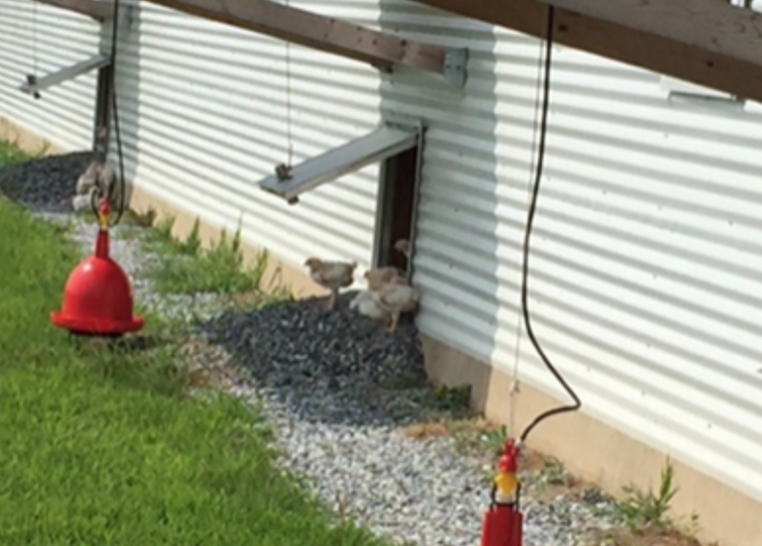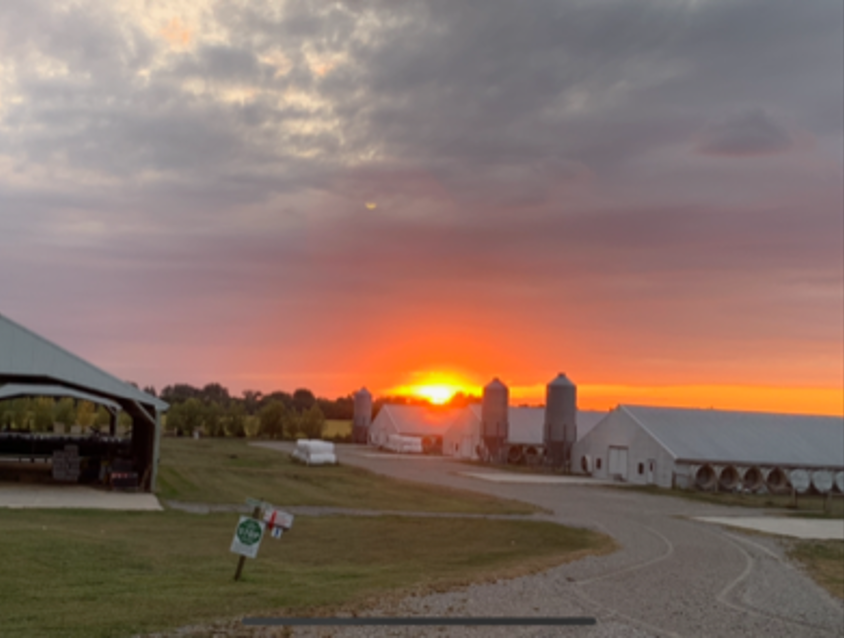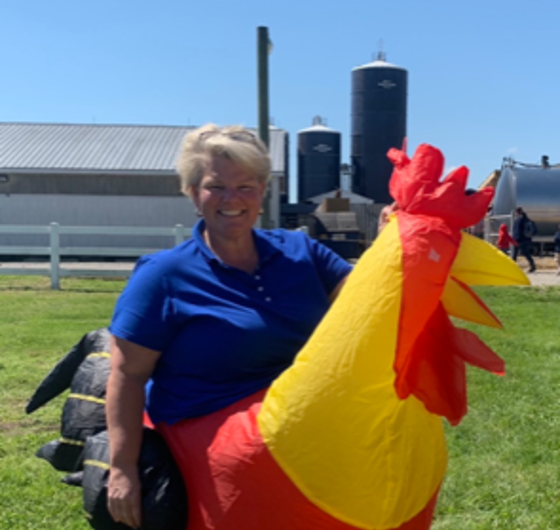Georgie Cartanza owns and operates an organic poultry farm in Delaware. Georgie’s farm has four houses that places over 800,000 broilers a year. In one year her farm could feed 780,000 families a rotisserie chicken for a night.
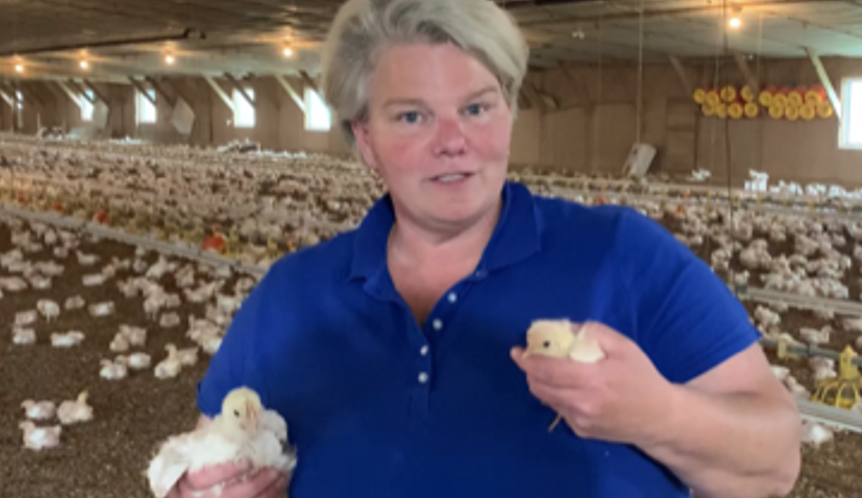 Georgie did not grow up on farm. While in high school she developed an appreciation for farm families. The challenges, struggles, and risks that farmers take to provide food for the rest of us. This inspired her to want to do something to help farmers. She earned a degree from Delaware State University in General Agriculture. Uncertain of what area of agriculture she would work in, Perdue Farms happened to do on campus interviews. That interview led to the opportunity to work in the poultry industry on Delmarva. Georgie worked for Perdue and Mountaire, as a service advisor and housing specialist.
Georgie did not grow up on farm. While in high school she developed an appreciation for farm families. The challenges, struggles, and risks that farmers take to provide food for the rest of us. This inspired her to want to do something to help farmers. She earned a degree from Delaware State University in General Agriculture. Uncertain of what area of agriculture she would work in, Perdue Farms happened to do on campus interviews. That interview led to the opportunity to work in the poultry industry on Delmarva. Georgie worked for Perdue and Mountaire, as a service advisor and housing specialist.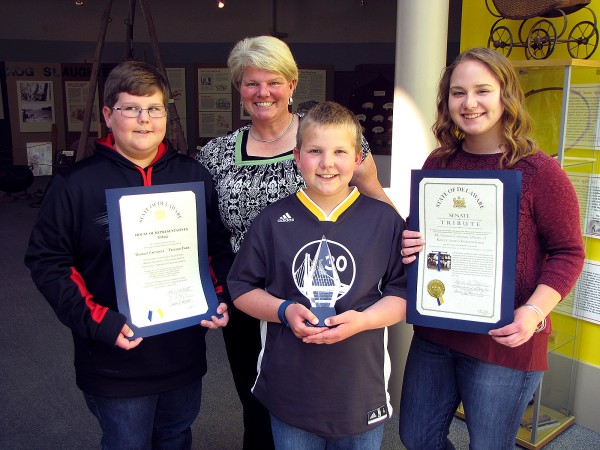
While working at Mountaire starting out brand new growers, Georgie thought having her own poultry houses would be a way to help pay for her children to further their education and give her more time closer to home. Over the past 25 years, Georgie feels that she has been blessed with many opportunities because of getting in the poultry business.
She also works for the University of Delaware as a Poultry Extension Agent who works with poultry farmers, integrators, and the public. Georgie works to build awareness and understanding about best management practices and the impact the poultry industry has on the community through research, outreach, and education. Bridging the gap between perception and reality is Georgie’s primary goal.
Georgie has received awards for environmental stewardship from the conservation district and the Governors’ Conservation award. In 2017, Georgie was chosen as the first Nuffield International Farming Scholar from the United States. The Nuffield Farming Scholarship gave her the opportunity to travel to eight countries exploring new technologies that could be beneficial to the sustainability of the poultry industry.
How do you practice environmental stability on your farm?
I adopted conservation practices to reduce infiltration of nutrients into groundwater. Those practices include construction of manure storage buildings, composters, heavy use pads located at both ends of the poultry houses and manure storage buildings. The heavy use pads prevent manure from being ground into areas that have high traffic due to litter movement and birds being transported from the houses. In 2018, this farm started using in vessel composting to help improve the quality of composted material. The farm is encircled with a vegetative buffer that consists of hybrid willows and green giant arborvitaes. This vegetative buffer acts as a windbreak saving electric and fuel, helps capture dust and particulates from the fans, and makes the farm more aesthetically pleasing to neighbors.
I look for opportunities to save energy by upgrading equipment to improve energy efficiency like installing LED light bulbs. In the next couple of years I am considering installing solar as a renewable energy source.
What is your least favorite thing about chicken farming?
There are two things that used to be my least favorite part of chicken farming. The first was traditional composting. This required layering mortality with manure and a carbon source and then turning those piles. In 2018, I purchased an Ecodrum in vessel composter that made composting much less labor intensive and dramatically improved the quality of composted material.
The second was power washing fans because it was an extremely dirty job. Investing in a poultry house washer made this task easier and more efficient.
What’s one thing about chicken farming you wish more people would know?
It is difficult to choose one thing that I would like more people to know. First off, I would like people to know how much farmers care about the animals they raise. They give their time, attention, and care to insure birds have what they need and they are comfortable. They are available 24 hours a day, 7 days a week. When an alarm goes off they get up and go out check on those birds; day or night, in the cold, in the heat, in the rain, and in the snow.
Secondly, farmers care about the environment and are the first environmental stewards. Farmers understand better than the average person that you must take care of the soil, water, and air or it will not take care you. Lastly, all commercially grown birds are antibiotic-free when they go to the processing plant, and no matter what the package says they are all steroid and hormone free.
What has it been like farming during COVID-19?
Poultry farms have practiced biosecurity that limited individuals from coming to poultry farms. This is for the protection of the birds. So how tasks were performed on the farm has not changed. What has changed is the level of anxiety with not knowing how COVID-19 could affect the supply chain. That anxiety comes from not knowing when birds will move, will the farmer have to keep them longer, how long will there be between flocks, will the farm get less birds, and ultimately how will these things effect the grower’s ability to pay their expenses.
One of the ways I have coped with the stress and anxiety of the quarantine was to make videos to share about how chickens are grown and some fun videos taking Elton John’s song “Rocket Man” turning it into “Chicken Man.”
What is your favorite chicken dish?
My favorite chicken dish is chicken and avocado tacos with creamy cilantro sauce.
Get a glimpse into a day in the life at Georgie’s poultry farm:
